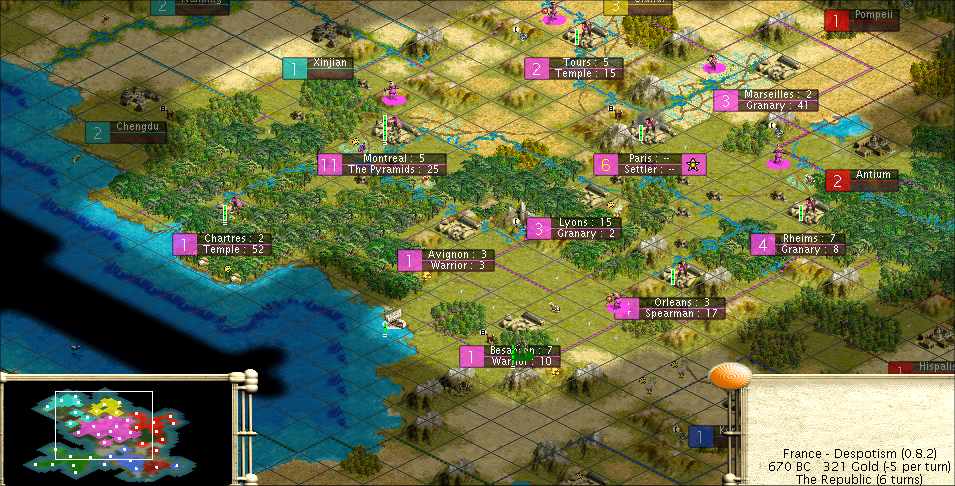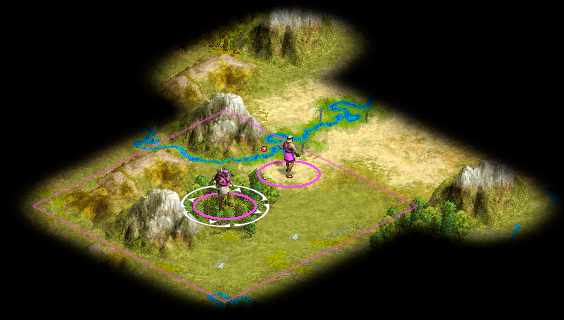
I decided to found on the starting square. Founding there would have three flood plains tiles in range, which is enough to get the city to the +5 food threshold for growth every two turns, in despotism. I'm hoping to found an off-capital city to be my cultural city, while letting Paris produce settlers quickly as per usual.
In 3650 BC, we meet Rome. He's got a worker, but we can't buy it. I trade him Masonry for his Warrior Code + 10g.
Pottery finishes in 3500 BC (that was pretty fast), and max research on Ceremonial Burial started. I did a lot of micromanaging on Paris' tiles, to produce warriors a turn sooner without losing speed on growth. I also decided against popping the hut southish of Paris for fear of barbarians. My early build order was three warriors, then a granary. All the warriors went exploring, leaving no military at home.
In 3300 BC, the Zulu are contacted; they have Bronze Working and Ceremonial Burial and 35g, must have been very busy popping huts! I would buy one of the techs to trade to Rome, but Rome doesn't have anything to trade me.
One of those exploring warriors finds a very fertile little valley.
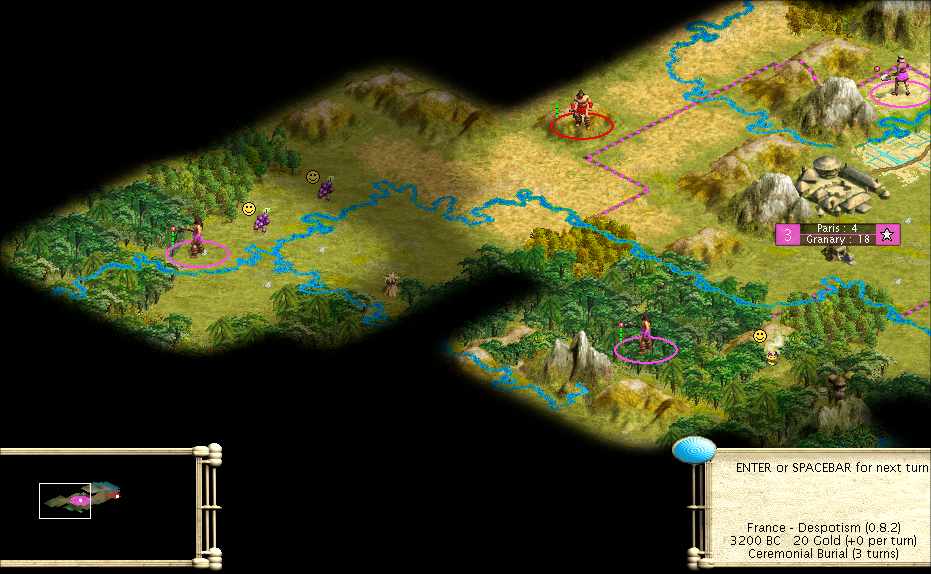
Finally, at long last after a half-dozen attempts, I'll get to play for a 20k cultural victory away from the capital! Paris swaps from the granary to a settler.
In 3050 BC, my western warrior meets China, and we trade Alphabet for Bronze Working and his 10g. Ceremonial Burial has finished, and I get a chance to try out the 40-turn Mathematics tactic. The next turn, we meet the Aztecs, and can trade Masonry + 14 gold for Mysticism (at monopoly), and I decide to do the usual 40-turn try on Polytheism instead. :)
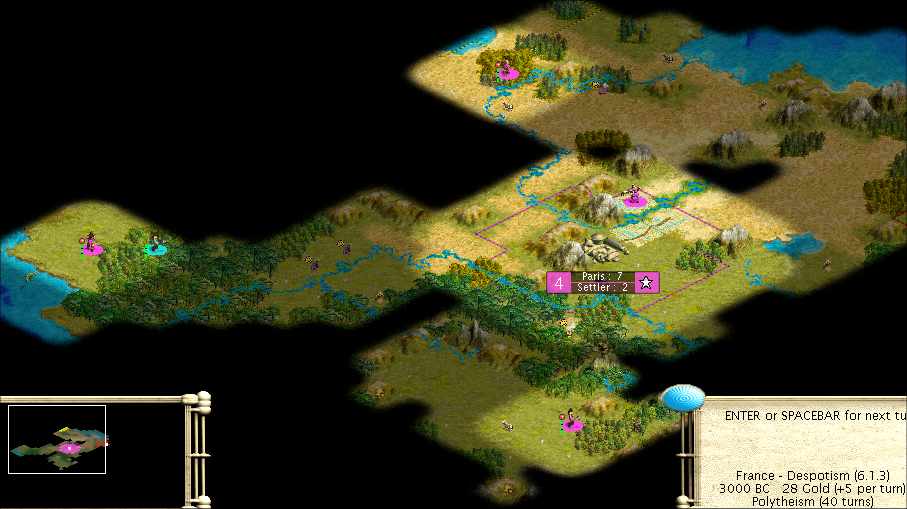
I spent a long time deciding on the exact site for my glorious city. The best spot, I think, is on the northern wines tile. With the wheat and other wines in range, that will still reach the +5 food threshold in despotism for fast growth, and it pulls in a very nice total of FIVE bonus grasslands and three hills as well for wonder building. And of course, it means the city has the luxury happy face immediately and always.
Such a glorious city needs a glorious name. It must be that bastion of French culture known as... Montreal!

I love that little happy face peeking out from the city. Trés appropriate!
I meet Germany the next turn, who kindly trade me Iron Working for only Masonry plus 64 gold. Iron Working can then buy The Wheel off China.
I sent Paris's initial worker over to Montreal to improve its tiles. Paris got along without one (it's got four good improved tiles) until it managed to put together a granary and another worker.

Well, that sets me back a bit...
Montreal also gets imperiled by a barb attack, but that spearman you saw being built there in Paris arrives just in time.
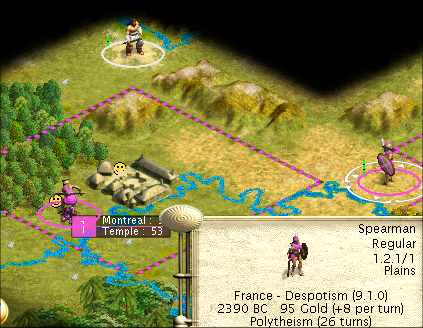
In 2350 BC, I get treated to a welcome sight: a Chinese unit autorazes a Zulu city. Man, these wolves just couldn't wait to start tearing each other apart!
The Zulu eventually get Writing and trade it to me for Iron Working and some gold. Now wait a minute - how the heck did nobody have Writing two turns ago, and now Rome has Philosophy? Must have been a hut, though I'm surprised there's still some around.
In 1750 BC, I whip the temple in Montreal (whipping will speed the city's growth overall since it will bring the wheat in range).
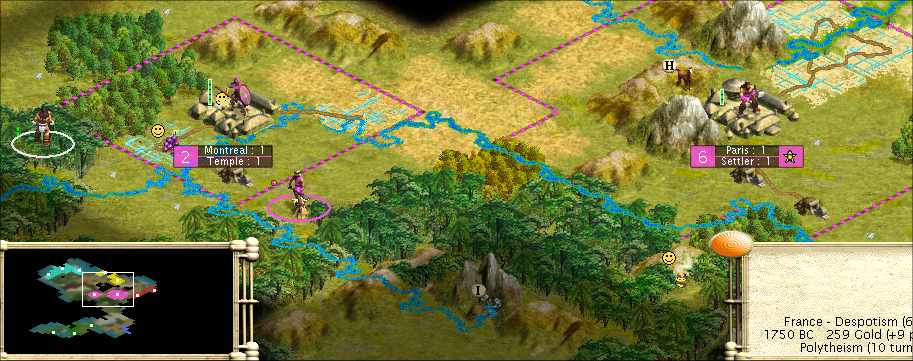
Granary is next up in Montreal; having that will, I think, result in getting to a wonder sooner overall. In this city, faster growth means faster shield production very quickly with all those bonus grasslands around.
I finally get a third city founded in 1650 BC. My notes for this say "It isn't the greatest location, but I couldn't see any better". I am completely baffled - I really, honestly, have no idea what sort of crack I was smoking...
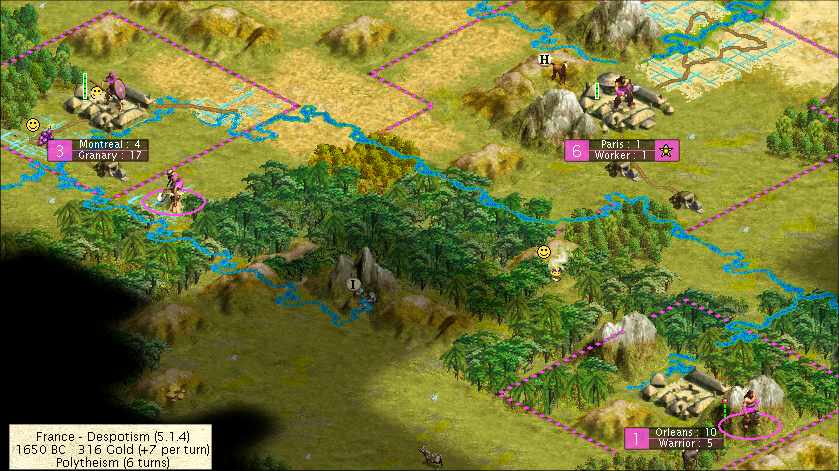
Mathematics does indeed get around; good thing I picked Polytheism for the minimum research try. In 1625 BC, China sells me contact with Japan for $16. They are doing absolutely terribly - and what's with that dip to zero score? They must have respawned! And from looking at the map later, they were attacked and respawned before they even got a second city out. Rabid wolves!
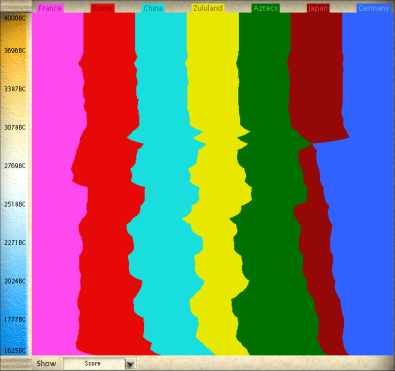
I whipped Paris's next settler, and founded a city one NE of the incense. That's better spacing with Montreal than directly on the incense, and saves a hill to produce shields later.
Polytheism comes in; I'm the first one with it. I trade it to Monty for the kingly sum of 60 gold, Philosophy, Horseback Riding, and Mathematics.
And, uh, it's 1500 BC and only ONE CIV has STARTED the Oracle, and NONE the Pyramids. Huh?! I establish some of the embassies, and the only wars that turn up are Germany vs Japan (they must have caused the Japanese respawn) and China vs Zulu. I guess all these militaristic civs just don't like building.
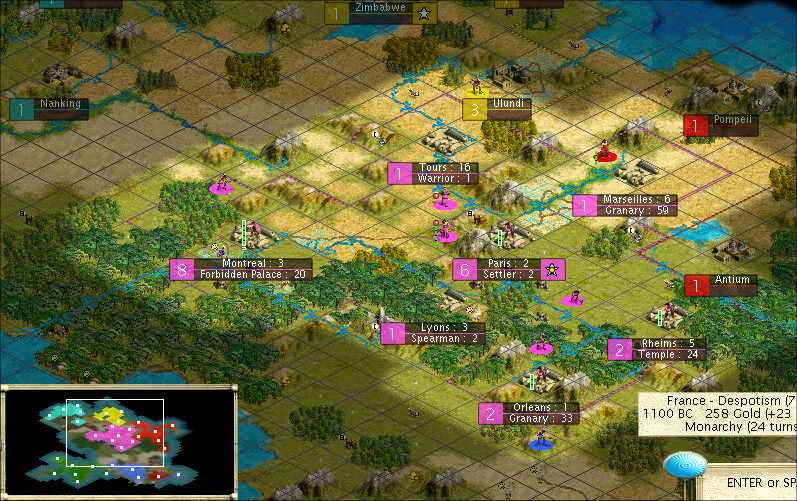
Paris can turn out settlers in steady state every 4 turns between size 5 and 7, finally.
Heh, how often does this happen - the computer suggests building The Pyramids in Montreal (after its granary), and I take it up on that offer. :)
I got confused somewhere, and meant to buy somebody's world map to see what was around, but wound up buying Map Making instead for 210 gold. Well, I still recouped most of that back with map brokering. (I must have been playing this game really late at night, or something...)
In 975 BC, Code of Laws gets around to a bunch of civs, including the Zulu that don't have Map Making, and so we trade those techs.
Tough call - with 21 turns of minimum research already done into Monarchy (to resell, not to switch to), do I swap over to maximum on Republic, which would take 28 turns (but that'll drop some as cities grow and libraries complete)? I think I have to - Republic Is Everything, as regular readers of my reports know. :)
The Aztecs get Construction a couple turns later, and they're definitely in the lead. Germany, Rome, and myself are all about tied for second.
With all the other cities clustered around Paris, Montreal had actually gotten to about half of its shields being lost to corruption. I decided I had to swap the city from a wonder to the Forbidden Palace now, which completes in Montreal in 730 BC. It's my earliest ever hand-built FP.
